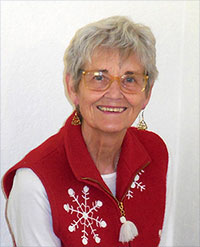New book celebrates Southeast Canneries; Pat Roppel's friends publish her last bookBy DAVE KIFFER
June 20, 2019
Roppel published 13 books and hundreds of historical articles, including a region-wide historical column that appeared in a variety of formants for nearly two decades. She was also well known for the help she gave to other historians over the decades, encouraging their projects as is they were her own, pushing them to further tell Southeast Alaska's story. In addition to stories about the people of Southeast, Roppel focused on the industries such as mining and fishing that helped Southeast grow. She also wrote extensively about the mercantile businesses that supported the area and wrote historical guides to Revillagigedo and Gravina Islands and Misty Fjords. She was twice named Alaska Historian of the Year. But her true historical love was the salmon canneries of the region, the often self-contained little "villages" that sprouted up in the region from the 1900s to the 1950s, sometimes vanishing within months but also sometimes also forming the backbone of more permanent communities from Metlakatla to Yakutat. In addition to gathering all the historical information she could on those canneries, Roppel and her husband Frank used their boat to visit many of the cannery sites over the decades, often documenting the only physical evidence that the canneries existed. Roppel left one last historical gift to the residents of Southeast. Four years after her death, her research is the basis of a new book, "Tin Can Country," the brainchild of longtime Roppel friend Karen Hofstad of Petersburg and Petersburg's Clausen Memorial Museum. Juneau based writer/historian Anjuli Grantham was the editor/coordinator of the project which features contributions from half a dozen other regional historians supplementing Roppel's work.
Hofstad's work on the historic salmon can labels of the region ties the book together. But there are also chapters on several prominent canneries (More than 130 canneries operated at different times in the region), in addition to stories about the fish traps that supplied them and the sometimes controversial labor histories of the industry. The story of Southeast's canneries goes back to the late 1870s, a decade after the United States purchased Alaska from Russia. The Russians had been more interested in Alaska's fur trade than the potential riches in the salmon industry, but proponents of the sale, like US Senator Charles Sumner were very aware of the potential riches and spoke glowingly about it on the floor of the Senate. Roppel's research covered the early cannery in Klawock and the tentative Russian saltry efforts at Ozerski Redoubt, as well as the early Aberdeen Packing Company efforts near Wrangell. She also wrote how salmon cannery pioneer Libby, McNeill and Libby was at the forefront of the American canned food industry in the late 1800s. The book, also featuring the efforts of prominent writers such as Bob King and Jim Mackovjak, also covers the elaborate salmon canning process and the use of fish traps to feed the industry that grew into Alaska's largest in the 1920s. There are histories of Loring, Petersburg, Hunter Bay, Kake. Excursion Inlet, Ward Cove and other areas. Of course, there is a nod to the infamous "fish pirates" that plagued the industry. Prominent people in the industry such as James Heckman, William Paul and August Buschmann are profiled. The canning industry's role in both World War I and World War II is also covered, as is the internment of both Alaskan Aleuts and German prisoners of war abandoned canneries during World War II. There is an entire chapter on the civil rights issues that arose when the canneries employed large numbers of foreign workers. Roppel profiles Goon Dip, a prominent Chinese labor contractor in the early years and Oscar Penaranda offers a first hand account of what it was like to be an "Alaskero" in the canneries. A chapter on Wards Cove details the three decade legal battle for equal rights that eventually reached the US Supreme Court. There is also a section on the efforts to preserve the cannery histories and the cannery sites, often an extreme challenge because of the remote sites and the encroaching rainforest that quickly reclaimed many of the sites when production stopped. Of great value to anyone interested in canning history is the eight page salmon cannery chronology compiled by Lewis McDonald in 1949 which notes that 134 canneries were built between 1878 and 1949, 65 burned down and were not rebuilt, five burned and were rebuilt, ten were moved to other sites and many others were closed and consolidated. There were still 37 canneries operating in 1949. Today, there are fewer than 10 canneries in operation, but "Tin Can Country" notes that a new cannery opened up in Sitka in 2014. It offers hope that the industry that affected nearly every corner of Southeast Alaska, will continue on for another 100 years.
Related:
Editor's Note:
On the Web:
Contact Dave at dave@sitnews.us Dave Kiffer ©2019 Publication fee required. © Representations of fact and opinions in comments posted are solely those of the individual posters and do not represent the opinions of Sitnews.
|
|||||




